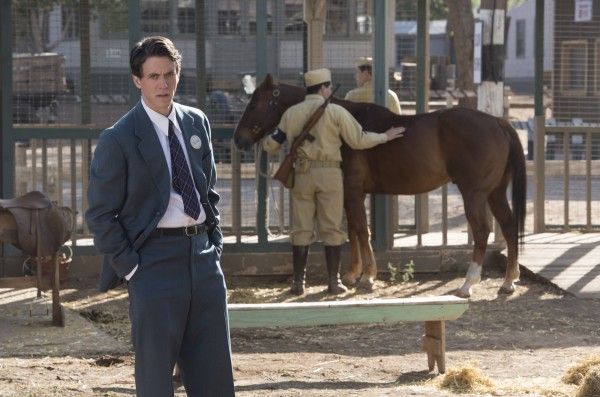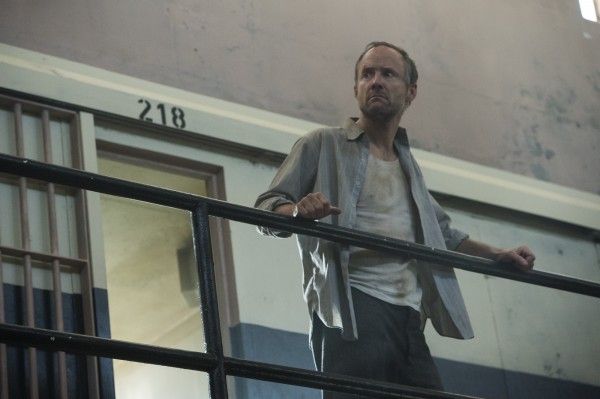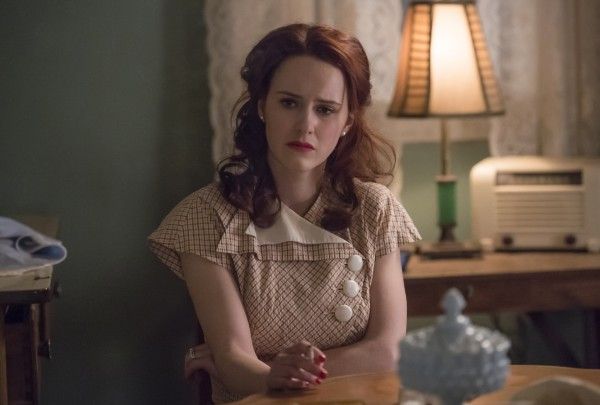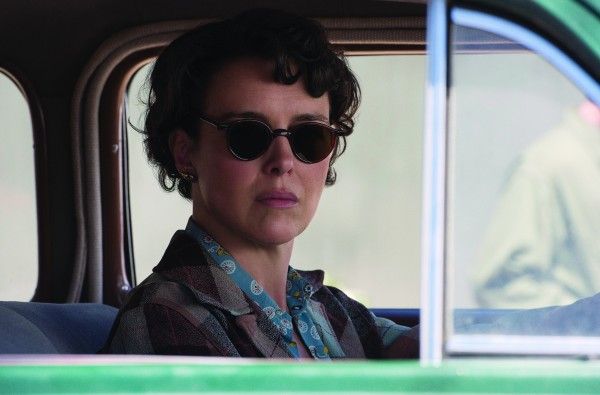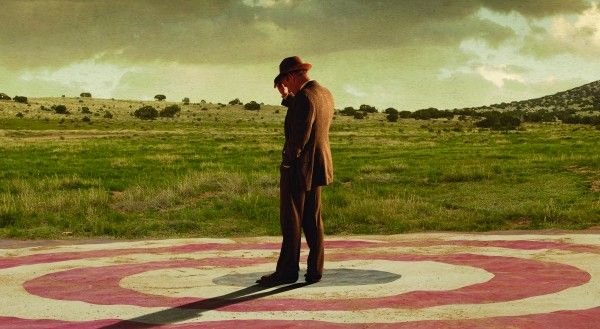In the space between a working design, and a design that works, empires burn.
Last year, WGN America delivered one of the most unexpected delights on television with Manhattan, a tightly scripted, snappy period drama about the American race to build a nuclear bomb. From creator Sam Shaw (Masters of Sex), Manhattan follows a fictionalized version of group of brilliant minds behind the Manhattan Project, sequestered away at "The Hill," an Army base in Los Alamos, New Mexico, where they sacrifice their freedoms, compromise their ethics, and risk their sanity in the race to build the bomb and end the war.
Manhattan’s first season took a few episodes to hit its stride, but once the series found a groove, it was a force. Shaw's scripting was impeccable, a propulsive narrative of ambition and paranoia backed by whip-smart dialogue and a wealth of compelling, unpredictable characters. Season 2 maintains all those good qualities, but also faces the same struggle to regain footing as it broadens the scope of the story.
After establishing him as a mercurial man of mystery, the show finally delves into the figure of Robert Oppenheimer (Daniel London) and introduces a bevy of new guest stars, including Neve Campbell as Oppenheimer's deliciously fiery wife, William Peterson as the base's new Army Commander, and Mamie Gummer as a vivacious new member of the Women's Army Corp. There's a tangible adjustment period while the series adapts to these new characters and the circumstances they bring with them, but Manhattan admirably expands and grows, rather than retread the beats that made Season 1 such a success.
At the same time, the series has to establish a new power structure in the wake of Season 1's finale, which saw lives lost, marriages shattered, and John Benjamin Hickey's Frank Winter – who acted as a dramatic anchor throughout the first season – shipped off to god knows where. There's a reason this year's catch phrase is "The Fallout Begins," and indeed the fallout from the Season 1 finale sends the entire ecosystem of The Hill into chaos. The warring factions of scientists are no more. Implosion is now the only solution. And young Charlie Issacs (Ashley Zukerman) steps up as the "force of nature that fills up the Frank-shaped vacuum."
And Frank's absence truly is a vacuum. Thanks to Hickey's beautifully empathetic performance, Frank emerged from the first season a divisive, but compelling figure of authority who shepherded our pack of overworked, under-socialized geniuses. Indeed it's the Frank-centric second episode, "Fatherland," which stands as the highlight of the four new episodes provided to the press. Without giving too much away about Frank’s current whereabouts, the episode is almost a side-shot that answers the running question, “Where’s Frank?” in a grim, engrossing fashion. Featuring an excellent turn from guest star Justin Kirk, "Fatherland" not only reveals Frank's predicament, but offers insight to the man himself – arguably the most enthralling character on a show that is an embarrassment of riches in that regard. The episode also gives a new perspective on just how far the powers-that-be are willing to go to win this war, and how truly fragile freedom is.
With Charlie now at the helm of the implosion project, the tangled affairs of the Los Alamos residents become a matter of national security. Or at least, that's how the new Army Commander sees it. Driven by the belief that God wants him to end this war, he unleashes a furious scorn on the weaselly Crosley (Harry Lloyd) when the scientist requests a transfer away from the woman who broke his heart. As that woman (Helen Prins), Katja Herbers continues to deliver a breakthrough performance as the only female scientist on The Hill -- and an unrelenting, uncompromising woman at that. Her relationship with Charlie grows ever-more strained as he attempts to mend his marriage and assume his new position of authority. Meanwhile Charlie's wife Abby (Rachel Brosnahan) takes on a darker persona; her naïve world view was rocked by the events of last season, which saw her slink into bed with a fellow army wife before double-crossing her out of self-preservation. Abby only sinks further into her scheming, taking on shades of Lady Macbeth as she plays a deadly tactical game to further advance Charlie's skyrocketing career.
Then there's Meeks (Christopher Denham), the mole within the camp, who is violently forced to confront the costs of his wavering alliances. So lovable and soft-spoken, Meeks is committing tremendous acts of treason, seemingly for a reason he believes to be just – though that reason is yet to be revealed. At the same time he is still a great friend to Fritz (Michael Chernus), resident comic relief, and perhaps the only truly good person on The Hill.
Thanks to this wonderful ensemble cast, even the Frank-less episodes are engaging, but his absence is dearly felt. Still, having faith in Shaw's scripting abilities, that very well may be the point, as Frank's name is brought up again and again by the characters who clearly feel his absence too. If there's one joy borne out of Frank's MIA status, it's that his wife Liza is allowed to take center stage. A brilliant scientist kept in place by the gender norms of the era, Liza is a fractured but tenacious woman, played by Olivia Williams with heartbreaking tenderness and delicacy. With Liza on the hunt for her husband, she becomes an even more powerful and unpredictable figure, unafraid to cross lines, willing to do whatever it takes to retrieve him. Her standoff with Peterson's Colonel Darrow is a highlight, and the two essentially engage in a dick-measuring contest of obstinance.
By framing the premiere episode with the Trinity detonation, the stakes of the action remain staggeringly high. Every second they don’t develop this weapon is a second more soldiers die, a second when the Germans or the Soviets have a chance to beat them to the punch. And every move is scrutinized. Every word monitored. Every turn fair game for a higher up to misconstrue as treason. Every new face a possible new spy. Every second they don’t perfect the weapon, a second they don’t get to go home. And every step of the way, the audience knows, ultimately, even in their success, there is no going home from this.
Manhattan's first season dealt heavily in secrets: the cost of keeping them, even from your loved ones, the cost of being the one kept in the dark, and of course, the cost of letting them slip. Season 2 sees those secrets dangerously close to revelation. More characters than ever are in the know, and that knowledge brings its own set of unexpected privileges and consequences. Season 1 was tight, contained – a frenzy of dramatic action that appropriately grew more explosive with each episode as those secrets threatened to spill. But as we all know, the story of the atomic bomb is a massive one that ends in devastating international consequence. Their eventual success in perfecting the gadget means a triumphant end to the war, but also costs hundreds of thousands of innocent lives. Bearing that in mind, a broader scope is not only the right step, but an essential one. So even if the series experiences slight growing pains as it learns to play in this new, bigger sandbox, it's exactly the sandbox it should be playing in.
Rating: ★★★★★ Excellent


